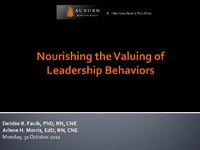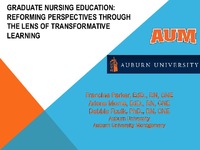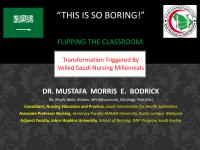| dc.contributor.author | Faulk, Debbie R. | en |
| dc.contributor.author | Morris, Arlene H. | en |
| dc.date.accessioned | 2012-01-11T10:48:01Z | |
| dc.date.available | 2012-01-11T10:48:01Z | |
| dc.date.issued | 2012-01-04 | |
| dc.identifier.uri | http://hdl.handle.net/10755/201699 | |
| dc.description | <p>41st Biennial Convention - 29 October-2 November 2011. Theme: People and Knowledge: Connecting for Global Health. Held at the Gaylord Texan Resort & Convention Center.</p> | en |
| dc.description.abstract | <p>Returning RN students bring a preconceived idea that learning will focus on enhancement of knowledge regarding intensive or medical/surgical nursing, and may not value leadership and management courses. Working from this assumption that leadership behaviors are undervalued by returning nursing students, nurse educators must consider the following question: "How can we help nursing students value leadership and the importance of developing leading and managing behaviors?" The returning RN student brings a unique persona to baccalaureate education through life and work experiences, motivation, competency, culture, values, and beliefs. These prior experiences (personal and professional) provide a foundation from which new learning or relearning regarding leadership and management can be nourished. Some returning students have observed the impact of effective leaders, while others have observed the need for improvement in management. Our primary thesis is that the valuing of leadership skills by RNs returning for a baccalaureate degree can be promoted through use of transformative learning strategies. In this presentation, we will provide support for our thesis by offering examples of teaching and learning strategies developed using the key transformative learning elements of critical reflection and dialogue in both micro and macro system leadership courses. Critical reflection and dialogue enable learners to become engaged to imagine alternatives to prior held assumptions and to critically reflect on their role as nursing leaders and managers in micro and macro health care delivery systems. Anecdotal comments from students demonstrate valuing leadership and provide insight to how the personal underlies and nourishes the professional.</p> | en |
| dc.format | Text-based Document | en |
| dc.language.iso | en_US | en |
| dc.subject | Transformative Learning | en |
| dc.subject | Leadership | en |
| dc.subject | Valuing | en |
| dc.title | Nourishing the valuing of leadership behaviors | en |
| dc.type | Presentation | en |
| dc.rights.holder | <p>
All rights reserved by the author(s) and/or publisher(s) listed in this item record unless relinquished in whole or part by a rights notation or a Creative Commons License present in this item record.
</p><p>
All permission requests should be directed accordingly and not to the Sigma Repository.
</p><p>
All submitting authors or publishers have affirmed that when using material in their work where they do not own copyright, they have obtained permission of the copyright holder prior to submission and the rights holder has been acknowledged as necessary.
</p> | en |
| dc.description.note | <p>Items submitted to a conference/event were evaluated/peer-reviewed at the time of abstract submission to the event. No other peer-review was provided prior to submission to the Henderson Repository, unless otherwise noted.</p> | |
| dc.type.category | Full-text | en |
| dc.evidence.level | N/A | en |
| dc.research.approach | N/A | en |
| dc.author.details | Debbie R. Faulk, PhD, RN; Arlene H. Morris, EdD, RN | en |
| dc.conference.name | 41st Biennial Convention: People and Knowledge: Connecting for Global Health | en |
| dc.conference.host | Sigma Theta Tau International | en |
| dc.conference.location | Grapevine, Texas, USA | en |
| dc.date.conferenceyear | 2011 | |
| dc.description.reviewtype | Abstract Review Only: Reviewed by Event Host | en |
| dc.description.acquisition | Proxy-submission | en |





